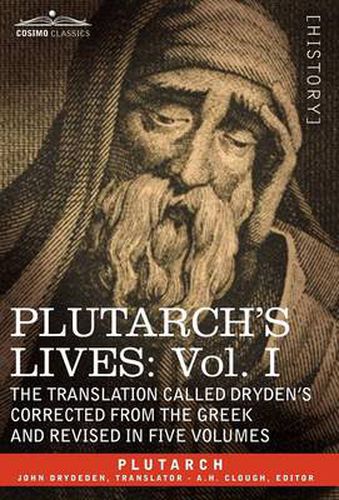Readings Newsletter
Become a Readings Member to make your shopping experience even easier.
Sign in or sign up for free!
You’re not far away from qualifying for FREE standard shipping within Australia
You’ve qualified for FREE standard shipping within Australia
The cart is loading…






This title is printed to order. This book may have been self-published. If so, we cannot guarantee the quality of the content. In the main most books will have gone through the editing process however some may not. We therefore suggest that you be aware of this before ordering this book. If in doubt check either the author or publisher’s details as we are unable to accept any returns unless they are faulty. Please contact us if you have any questions.
When the Greek historian PLUTARCH (c. 46 A.D.-120 A.D.) set out to tell the tales of the famous figures from Greek and Roman history, he was more concerned with illuminating their characters than enumerating their deeds, more interested in exploring their moral failings and triumphs than in listing their conquests. The result: Plutarch’s Lives. Though Plutarch is known to have taken some liberties with his Lives-his comparisons of certain Greek and Roman figures are often more fanciful than strictly accurate-his words are, in many instances, the only sources of information that have survived for some personages. And in the aggregate, his radical approach to biography exerted a profound influence on the literature to come, particularly throughout the Renaissance and Enlightenment. Shakespeare lifted some passages verbatim from the Lives, and other writers inspired by Plutarch range from James Boswell to Alexander Hamilton to Cotton Mather. Ralph Waldo Emerson called the Lives a bible for heroes. Across the five volumes, Plutarch explores the stories of such notables as: Romulus - Pericles - Coriolanus - Pyrrhus Lysander - Pompey - Alexander Caesar - Cicero - Antony and others. Cosimo is proud to present these handsome new editions, based on the classic 17th-century translations by English poet and playwright JOHN DRYDEN (1631-1700), and revised and edited in the 19th century by Oxford scholar ARTHUR HUGH CLOUGH (1819-1861).
$9.00 standard shipping within Australia
FREE standard shipping within Australia for orders over $100.00
Express & International shipping calculated at checkout
Stock availability can be subject to change without notice. We recommend calling the shop or contacting our online team to check availability of low stock items. Please see our Shopping Online page for more details.
This title is printed to order. This book may have been self-published. If so, we cannot guarantee the quality of the content. In the main most books will have gone through the editing process however some may not. We therefore suggest that you be aware of this before ordering this book. If in doubt check either the author or publisher’s details as we are unable to accept any returns unless they are faulty. Please contact us if you have any questions.
When the Greek historian PLUTARCH (c. 46 A.D.-120 A.D.) set out to tell the tales of the famous figures from Greek and Roman history, he was more concerned with illuminating their characters than enumerating their deeds, more interested in exploring their moral failings and triumphs than in listing their conquests. The result: Plutarch’s Lives. Though Plutarch is known to have taken some liberties with his Lives-his comparisons of certain Greek and Roman figures are often more fanciful than strictly accurate-his words are, in many instances, the only sources of information that have survived for some personages. And in the aggregate, his radical approach to biography exerted a profound influence on the literature to come, particularly throughout the Renaissance and Enlightenment. Shakespeare lifted some passages verbatim from the Lives, and other writers inspired by Plutarch range from James Boswell to Alexander Hamilton to Cotton Mather. Ralph Waldo Emerson called the Lives a bible for heroes. Across the five volumes, Plutarch explores the stories of such notables as: Romulus - Pericles - Coriolanus - Pyrrhus Lysander - Pompey - Alexander Caesar - Cicero - Antony and others. Cosimo is proud to present these handsome new editions, based on the classic 17th-century translations by English poet and playwright JOHN DRYDEN (1631-1700), and revised and edited in the 19th century by Oxford scholar ARTHUR HUGH CLOUGH (1819-1861).